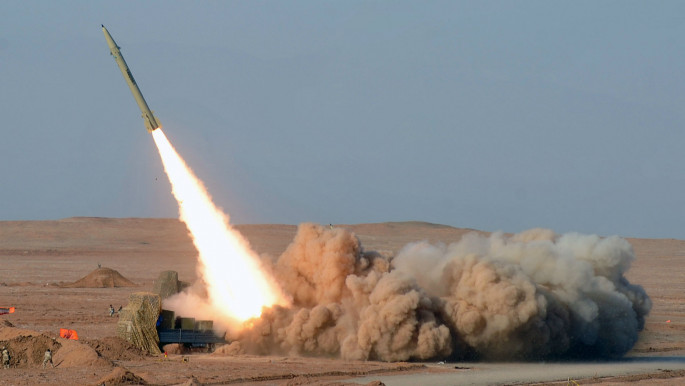Khamenei says 'missiles, not negotiations' key to Iranian security
Khamenei says 'missiles, not negotiations' key to Iranian security
Iran's top leader Ayatollah Ali Khamenei has said missiles are key to the Islamic Republic's future, offering support to the Revolutionary Guards that have drawn criticism for testing ballistic missiles.
3 min read
Iran has argued that these missiles are not covered by the UN resolution [Getty]
Iran's supreme leader said on Wednesday that missile power was key to the country's future security, slapping down moderates who say the focus should be on diplomacy.
Ayatollah Ali Khamenei, who has the final say in all matters of state in Iran, praised the powerful Revolutionary Guards for their "show of advanced and precise missiles" in recent tests that have drawn criticism from the West.
"In this jungle-like world, if the Islamic republic seeks negotiations, trade and even technology and science, but has no defence power, won't even small countries dare threaten Iran?" Khamenei said in remarks published on his official website.
"Our enemies are constantly enhancing their military and missile capabilities and given this how can we say the age of missiles has passed? Those who say the future is in negotiations, not in missiles, are either ignorant or traitors," he added.
His comments appeared aimed at ex-president Hashemi Rafsanjani, a senior leader of the reformist and moderate camp, who last week tweeted: "Tomorrow's world is the world of dialogue, not missiles."
The two men have not seen eye to eye on many domestic and foreign issues in recent history.
Rafsanjani was not allowed to run for the presidency in 2013 and one of his sons, Mehdi, is serving a jail term for corruption. Rafsanjani, however, won a place in recent elections in the assembly of experts, which is in charge of appointing the next supreme leader.
Khamenei's remarks came a day after the United States, France, Britain and Germany said Iran's recent ballistic missile tests violate UN Security Council resolutions.
The same four countries, along with Russia and China, reached the historic agreement with Iran last year that saw Tehran scale down its nuclear programme in exchange for the lifting of sanctions.
A joint letter from the US and other Western powers sent on Monday to the UN Security Council said that missiles recently fired by Iran were "inherently capable of delivering nuclear weapons".
The letter said the missile launches were "destabilising and provocative" and defied a 2015 UN resolution 2231.
The resolution includes the terms of the nuclear accord.
Iran argues that these missiles are not covered by the UN resolution that accompanied the nuclear accord.
Iran has twice tested ballistic missiles since the July 14 deal, prompting Western condemnation and new US sanctions.
"The enemies of the revolution... use dialogue, economic trade, sanctions, military threats and any other means to further their goals," Khamenei said. "We should be able to confront and defend in all of these fields."
In response to Iran's tests, the US Treasury last week named units of the Revolutionary Guards to its sanctions blacklist.
A Russian foreign ministry representative said on Wednesday that Iran's test launches of nuclear-capable missiles did not violate the UN resolution.
Ayatollah Ali Khamenei, who has the final say in all matters of state in Iran, praised the powerful Revolutionary Guards for their "show of advanced and precise missiles" in recent tests that have drawn criticism from the West.
"In this jungle-like world, if the Islamic republic seeks negotiations, trade and even technology and science, but has no defence power, won't even small countries dare threaten Iran?" Khamenei said in remarks published on his official website.
"Our enemies are constantly enhancing their military and missile capabilities and given this how can we say the age of missiles has passed? Those who say the future is in negotiations, not in missiles, are either ignorant or traitors," he added.
His comments appeared aimed at ex-president Hashemi Rafsanjani, a senior leader of the reformist and moderate camp, who last week tweeted: "Tomorrow's world is the world of dialogue, not missiles."
 |
|
| Iran has twice tested ballistic missiles since the nuclear deal [Getty] |
Rafsanjani was not allowed to run for the presidency in 2013 and one of his sons, Mehdi, is serving a jail term for corruption. Rafsanjani, however, won a place in recent elections in the assembly of experts, which is in charge of appointing the next supreme leader.
Khamenei's remarks came a day after the United States, France, Britain and Germany said Iran's recent ballistic missile tests violate UN Security Council resolutions.
The same four countries, along with Russia and China, reached the historic agreement with Iran last year that saw Tehran scale down its nuclear programme in exchange for the lifting of sanctions.
A joint letter from the US and other Western powers sent on Monday to the UN Security Council said that missiles recently fired by Iran were "inherently capable of delivering nuclear weapons".
The letter said the missile launches were "destabilising and provocative" and defied a 2015 UN resolution 2231.
The resolution includes the terms of the nuclear accord.
Iran argues that these missiles are not covered by the UN resolution that accompanied the nuclear accord.
Iran has twice tested ballistic missiles since the July 14 deal, prompting Western condemnation and new US sanctions.
"The enemies of the revolution... use dialogue, economic trade, sanctions, military threats and any other means to further their goals," Khamenei said. "We should be able to confront and defend in all of these fields."
In response to Iran's tests, the US Treasury last week named units of the Revolutionary Guards to its sanctions blacklist.
A Russian foreign ministry representative said on Wednesday that Iran's test launches of nuclear-capable missiles did not violate the UN resolution.



